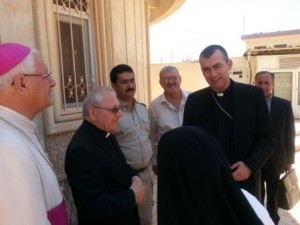Answer
Salam (Peace) Dear Amy,
Thank you for your question and for contacting Ask About Islam.
The Islamic government is based on the principle of the Khilafah, which means “representation.” Man, according to Islam, is the representative of God on earth; that is to say, by virtue of the powers delegated to him by God, and within the limits prescribed, he is required to exercise authority on earth.
The concept of Khilafah also means that the authority of representation is bestowed on the whole of a community if it is ready to fulfill the required conditions.
Every individual in an Islamic society enjoys the rights and powers of the Khilafah and in this respect all individuals are equal.
Thus, Islamic government is democratic for all practical purposes. But the difference is this: In Western democracy people are sovereign; in Islam God is sovereign and the people are His caliphs or representatives. In the former, the people make their own laws; in the latter they have to follow and obey the laws (Shariah) given by God through His Prophet.
In one, the government undertakes to fulfill the will of the people; in the other, the government and the people have to fulfill the will of God.
From the Islamic point of view, the aim and purpose of the state is the establishment, maintenance, and development of those qualities that God wants to be in Man, such as purity, beauty, goodness, virtue, justice, and equity.
The state also has to prevent all kinds of exploitation, injustice, and disorder. Besides, the principles of morality must be observed at all costs and in all walks of life; the state should base itself on justice, truth, and honesty.
It should never be prepared, under any circumstances, to tolerate fraud, falsehood, and injustice for the sake of political, administrative, or national expediency.
Islam imposes similar obligations on the state and the individual:
- to fulfill all contracts and obligations;
- to have uniform standards in dealings;
- to remember obligations along with rights and not to forget the rights of others when expecting them to fulfill their obligations;
- to use power and authority for the establishment of justice and not for the perpetration of injustice;
- to look upon duty as a sacred obligation and to discharge it scrupulously;
- and to regard power as a trust from God to be used in the belief that one has to render an account of one’s actions to Him in the life hereafter.
The ideal Islamic state is one where there is justice in the distribution of the resources of the state as well as in the dispensation of the law, where people are free to enjoy the blessings of God, and so there won’t be room for any grievance there.
From the foregoing, it is evident that under an Islamic government, the non-Muslims cannot be forced to practice a faith that they do not believe in because such coercion undermines the very core of the Islamic state, namely justice. No one in an Islamic system can flout justice.
Allah says in the Quran what means:
{O ye who believe! stand out firmly for God, as witnesses to fair dealing, and let not the hatred of others to you make you swerve to wrong and depart from justice. Be just: that is next to piety: and fear God. For God is well-acquainted with all that ye do.} (Al-Maidah 5:8)
The Quran also says what means:
{Let there be no compulsion in religion…} (Al-Baqarah 2:256)
As the above two verses clearly show, the principles of Islamic justice demand freedom of religious belief and practice, and the use of force has no place there.
Allah created Man as a free being, responsible and answerable for his choices and actions. This is a test for Man; and such a test can really take place only when Man is given full freedom.
And Allah knows best. Thank you and please keep in touch.
Salam.
